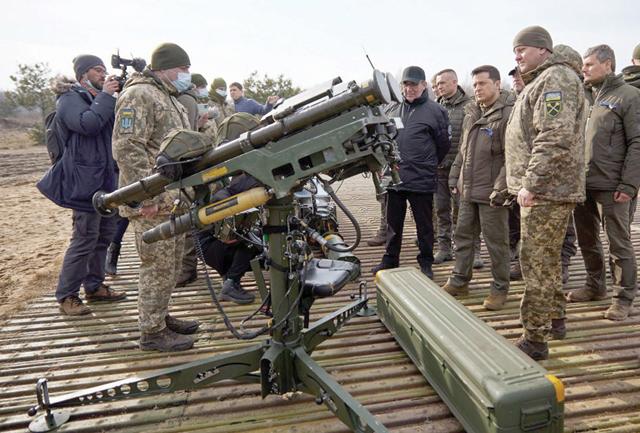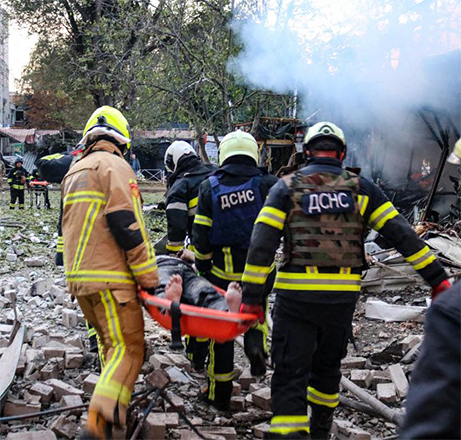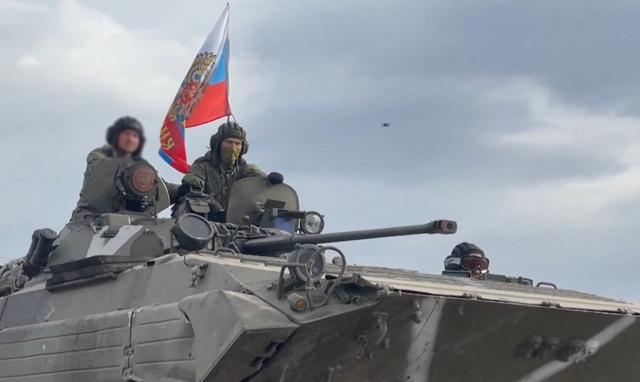You are here
Ukraine defies invasion threat, as NATO sees no Russian pullback
By AFP - Feb 16,2022 - Last updated at Feb 16,2022

This handout photo taken and released by the Ukrainian defence ministry on Wednsday, shows Ukrainian President Volodymyr Zelensky (second right) listening to explanations during a military drill outside the city of Rivne, northern Ukraine (AFP photo)
KYIV — Ukraine's leader vowed Wednesday that his country would stand tall against any invasion, as both he and NATO warned they could see no sign that Russia is withdrawing its forces.
President Volodymyr Zelensky watched troops training with some of their new Western-supplied anti-tank weapons on a range near Rivne, west of the capital.
Then he travelled to the frontline port city of Mariupol, and gave a speech to mark what he had declared Ukraine's "Day of Unity", wearing a military-style olive green coat and vowing resistance.
"We are not afraid of forecasts, we are not afraid of anyone, of any enemies," Zelensky said. "We will defend ourselves."
The demonstration of Ukrainian firepower and rhetoric contrasted with images on Russian state media that were said to show Moscow’s forces bringing an end to a major exercise in occupied Crimea.
But Zelensky denied that this was a sign of a Russian pullback.
“We are seeing small rotations. I would not call these rotations the withdrawal of forces by Russia. We cannot say that,” he said in televised comments, adding: “We see no change.”
In Rivne, missiles pounded targets and armoured vehicles manoeuvred and fired on the yellowing moorland, while in Kyiv hundreds of civilians marched in a stadium with an enormous national banner.
The “Day of Unity” displays came as the Kremlin called for “serious negotiations” with Washington, and European leaders pushed hard for a diplomatic resolution to the crisis.
But NATO chief Jens Stoltenberg, who hosted a meeting of the alliance’s defence ministers in Brussels, dismissed suggestions that the threat on the border had diminished.
He said the alliance would shore up its eastern defences with forward deployments in member states bordering Ukraine.
“Moscow has made it clear that it is prepared to contest the fundamental principles that have underpinned our security for decades and to do so by using force,” he said.
“I regret to say that this is the new normal in Europe.”
And on reported Russian troop movements, he said: “So far we do not see any sign of de-escalation on the ground; no withdrawals of troops or equipment.”
“Russia maintains a massive invasion force ready to attack with high-end capabilities from Crimea to Belarus.”
‘Signals give us hope’
Russia’s huge build-up of troops, missiles and warships around Ukraine is being billed as Europe’s worst security crisis since the Cold War.
Russian President Vladimir Putin has demanded Ukraine be forbidden from pursuing its ambition to join NATO and wants to redraw the security map of eastern Europe, rolling back Western influence.
But, backed by a threat of crippling US and EU economic sanctions, Western leaders are pushing for a negotiated settlement, and Moscow has signalled it will start to pull forces back.
In the latest such move, on Wednesday the Russian defence ministry said military drills in Crimea — a Ukrainian region Moscow annexed in 2014 — had ended and that troops were returning to their garrisons.
Washington has demanded more verifiable evidence of de-escalation, but US President Joe Biden has nevertheless vowed to push for a diplomatic solution.
Kremlin spokesman Dmitry Peskov welcomed this, telling reporters: “It is positive that the US president is also noting his readiness to start serious negotiations.”
German Defence Minister Christine Lambrecht, arriving at the NATO talks, said reports of a partial Russian pullback “are signals that at least give us hope. But it is important to observe closely whether these words are followed by deeds”.
EU leaders, already gathered in Brussels for a summit with their African counterparts, are now to hold impromptu crisis talks on Russia and Ukraine on Thursday.
Zelensky has downplayed threats of an immediate Russian invasion, but is attempting to rally his people with the “Day of Unity” celebrations under Ukraine’s blue and gold banner.
On Wednesday, after the Rivne drills, he visited Mariupol, a frontline port city near a breakaway region held by Russian-backed separatists.
Ambassadors from the European Union, Germany, Estonia, Poland and Spain headed to Mariupol with the president.
Rich return
Meanwhile, some wealthy business leaders who had been urged bby the government to show sold country announced their return.
Ukraine’s richest man, 55-year-old billionaire industrialist Rinat Akmetov, who was born in Donetsk in an area now held by separatists, was in Mariupol.
“We continue to build, we continue to invest,” he said, promising his firm would boost salaries and support a local university.
On Tuesday, Ukraine said the websites of the country’s defence ministry and armed forces as well as private banks had been hit by a cyberattack of the kind that US intelligence fears would precede a Russian attack.
“It cannot be excluded that the aggressor is resorting to dirty tricks,” Ukraine’s communications watchdog said, in reference to Russia.
Peskov denied that Moscow had any role in the cyber assault. “We do not know anything. As expected, Ukraine continues blaming Russia for everything,” he said.
Related Articles
KYIV — Two "super powerful bombs" rocked Mariupol on Tuesday as Ukrainian authorities made a fresh attempt at rescuing civilians from the be
KYIV — Ukraine on Thursday warned that difficult winter months lay ahead after a "massive" Russian missile barrage targeted civilian infrast
ZAPORIZHZHIA, Ukraine — Hopes for a weekend truce in Ukraine to celebrate the Orthodox Easter faded with talks between Moscow and Kyiv stall



















